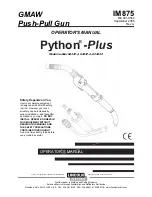
13
2
Safety
WARNING
A failure to observe the following safety instructions can have
serious consequences:
Danger to persons due to mechanical or chemical influences or failure of
important lifting accessory functions!
–
Please read the safety and danger information in this section thoroughly
before putting the lifting pin into operation.
–
In addition to the instructions in these original operating instructions,
observe the generally applicable safety and accident prevention
regulations.
–
In addition to the instructions in these original operating instructions,
observe the existing national occupational, operating and safety
regulations. Also comply with existing internal factory regulations.
2.1
Intended use
The operational safety of the lifting pin is only guaranteed if they are used as intended.
The lifting pins
are intended exclusively as lifting/hoisting accessory for lifting and holding
individual loads. The lifting pins are not suitable for rotating the load. Damaged lifting pins
can endanger lives.
Before each use,
check the lifting pin for visible defects (e.g.
deformations, breaks, cracks, damage, missing balls, corrosion, function of the release).
When inserting a lifting pin, the rotation of the load must be prevented. Contamination
(e.g. grinding sludge, oil and emission deposits, dust, etc.) can impair the function of the
lifting pin. Damaged lifting pins must be immediately withdrawn from further use. To
release the balls, press in the press button (A). By releasing the press button (A) the balls
are locked again.
Attention:
The press button (A) is locked when it is sprung back to its original position by
the spring force. The press button must
not
be actuated under load! Before operation, the
lifting pins must be checked for accidental or unintentional actuation of the press button to
release the lifting pin. Any accidental or unintentional release of the press button during
operation of the lifting pin must be ruled out by the operator / user.














































